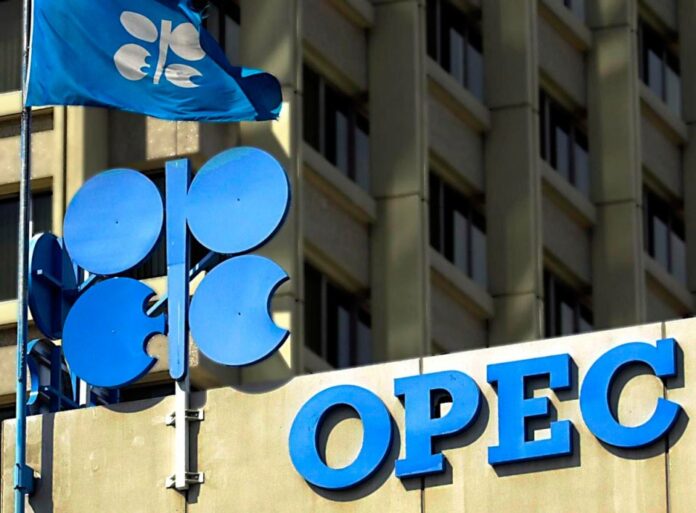•OPEC softens global demand by 135,000bpd
CHIGOZIE AMADI
The federal government’s aspiration to earn more foreign exchange got a boost in July, with oil production rising by as much as 30,000 barrels per day, to climb to 930,000 barrels of oil last month .
In all, Nigeria’s crude oil production in the month of July rose to 1.307 million bpd, the Monthly Oil Market Report (MOMR) of the Organisation of Petroleum Exporting Countries (OPEC), released yesterday showed.
The addition of 30, 000 bpd in July crude oil production, was an improvement on the production figure for June which stood at 1.276 million bpd, based on direct communication with Nigerian authorities.
But secondary sources indicated that Nigeria’s daily average crude oil production in July was 1.386 million bpd, an increase of 16,000 barrels compared to June’s figure of 1.369 million bpd.
Nigeria also maintained its position as Africa’s largest oil producer, with Libya following closely, producing 1.175 million bpd in July.
But despite the appreciable rise, the country is yet to meet its Organisation of Petroleum Exporting Countries (OPEC) quota of 1.58 million bpd.
As of last night, the upstream regulator, the Nigerian Upstream Petroleum Regulatory Commission (NUPRC) had yet to release its own data for the month under consideration.
Usually, the condensates are outside the OPEC calculation, but is usually added by the NUPRC, meaningful that with the projection, Nigeria’s condensates products which is about 300,000 bod daily could boost production for the month close to 1.6 million bod.
Recent, the Minister of Petroleum Resources (Oil) Senator Heineken Lokpobiri, stated that the country was aiming to reach a daily production of 2 million barrels by 2025.
Nigeria blames massive oil theft, pipeline vandalism as well as outright theft of its oil for its inability to meet its OPEC quota and by extension satisfy its aspiration to raise output considerably.
The country is desperately in need of FX to boost the value of the Naira compared to the dollar, a yearning that has remained largely hobbled due to underproduction of crude oil.
Meanwhile, underwhelming data so far this year and expectations of softening Chinese demand growth has prompted OPEC to cut its forecasts of global oil demand growth this year and next, in the first downward revision since the organisation issued its initial estimate for 2024 a year ago.
Global oil demand is set to grow by 2.11 million bpd in 2024, a still “healthy” growth pace, well above the historical average of 1.4 million bpd seen prior to the pandemic, OPEC said in the MOMR.
The latest demand growth estimate is 135,000 bpd lower than the assessment of a 2.25 million bpd increase from July. The downward revision reflected actual consumption data for the first and second quarters of this year, “as well as softening expectations for China’s oil demand growth in 2024,” OPEC said.
Total world oil demand is anticipated to reach 104.3 million bpd in 2024, bolstered by strong air travel demand and road mobility, including trucking, as well as healthy industrial, construction and agricultural activities in non-OECD countries, according to the cartel.
OPEC also trimmed its 2025 demand growth forecast to 1.78 million bpd, slightly lower than the increase of 1.85 million bpd expected in last month’s report.
“The global growth forecast is subject to many uncertainties, including global economic developments,” OPEC said.
The latest monthly report contained the first acknowledgment by the organisation that Chinese oil demand growth could disappoint this year.
The latest signals from China have been of sluggish economic indicators and uncertainties about whether the authorities could manage to reinvigorate the economy.
Despite OPEC’s first downward revision to its 2024 oil demand growth forecast, the gap between the cartel’s growth assessment and that of the International Energy Agency (IEA) remains at more than 1 million bpd more optimistic outlook from OPEC.
The IEA’s monthly report is due out on Tuesday, August 13, and could see another downward revision from the agency, which has been flagging weaker oil demand growth, including in China, so far in 2024.
Also, Lokpobiri has said that all industry players will need to collaborate to solve the many problems of the oil and gas industry.
“Collaboration is key to unlocking the full potential of our petroleum resources and ensuring sustainable growth for all Nigerians. In my meeting with members of the Oil Producers Trade Section (OPTS), we emphasised the importance of working together to meet our deliverables.
“Our discussions focused on implementing strategic measures that align with our shared goals of enhancing productivity and driving economic prosperity. We are committed to overcoming the challenges in the sector, ensuring that our collective efforts lead to tangible benefits for the nation and Nigerians,” he stated on his X handle.

























